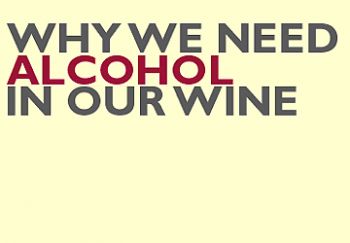Wine needs Alcohol.
There’s
been a lot of talk lately about avoiding alcohol – the bete
noire of many – while still preserving the health benefits
of wine, a sort of having your antioxidant and not drinking
it too. Grape juice, dealcoholized wine, and resveratrol
capsules are being promoted as more temperate, more
healthful alternatives to wine. They certainly don’t pass
the taste test. Let’s critically examine what alcohol
brings, particularly to wine, most particularly to the
health of the wine drinker.
Alcohol, that is, ethyl
alcohol (ethanol), contributes body and flavor to wine,
helps to preserve and enliven it, and, through its
volatility, enables the all-important bouquet to
bloom.
Alcohol is reckoned by
medical scientists to account for at least 50 to 60 percent
of the many and now-familiar health benefits of wine
consumption. Some stubbornly insist it is all alcohol.
Polyphenolic antioxidants take care of most of the
remainder.
Some of the salubrious
effects involve a joint venture between alcohol and
polyphenols.
Most of the studied health
benefits of drinking concern the cardiovascular system, the
heart and blood vessels, especially the arteries, which
vitally supply the organs and tissues of the body with
oxygen, nutrients and defenses against diseases and
injuries. Moderate drinking appears to reduce
atherosclerotic disease – heart attack, stroke and related –
by more than 40 percent, and probably alleviates the ravages
of aging, cancer, dementia (including Alzheimer’s disease),
immune dysfunction, inflammation, cataract formation, and
other degenerative diseases. Recent research suggests that
wine consumption might lead to increased life
span.
Immoderate drinking, in
contrast, damages many body organs, impairs health, hastens
death, and fosters antisocial consequences. Alcohol is the
only toxic component of wine, but it is a matter of
quantity.
Now there is additional
evidence that alcohol can be considered essential to the
beneficial effects of wine upon health, and, therefore, that
efforts to eliminate alcohol are ill conceived. Research at
the US Department of Agriculture laboratory, published
recently by Chanjirakul, et al., in the journal of the
science of food and agriculture, demonstrates that alcohol
promotes the antioxidant capacity of berries, and enhances
their resistance to decay in so doing. Also, it has been
thought for some years that the alcohol elaborated during
fermentation improves the extraction of healthful
polyphenols from grape skins.
The moral seems clear to
me: spare the alcohol and lose much of the pleasure and
healthfulness of wine. Just don’t go too far.

